Final report for ENC16-155
Project Information
High tunnels have become an important tool in Iowa’s specialty crop production. High tunnels are simple, plastic-covered, greenhouse-like structures that are passively ventilated and crops are grown in it directly in the soil. In Iowa, NRCS has supported the construction of over 350 new high tunnels in Iowa since 2010. The environment without rainfall, limited space, and potential climate control in a high tunnel requires unique set of crop management skills. One of the major issues identified by growers and grower organizations such as Practical Farmers of Iowa (PFI) and Iowa Fruit and Vegetable Growers Association (IFVGA) was sustaining, and in some cases re-building, soil quality inside high tunnels. Growers understand how important it is to manage soils well as it directly affects nutrient cycling, crop growth, health, development, and yields. Soil quality is degraded with intensive tillage and fertilization, monoculture, and removal of crop residues, which leads to poor soil structure, soil compaction, reduced water infiltration, and reduced soil biology. Growers need strategies to manage soil fertility, crop pests and diseases, soil quality, and soil organic matter under high tunnel production. One such strategy/practice is the use of cover crops. High tunnel is a high priced real estate when it comes to vegetable production so selection and planting of cover crops inside high tunnels need to be carefully designed without compromising grower profitability. Currently high tunnel growers search out information and rely on their own time consuming investigations to understand principles and practices of cover cropping. Without understanding these principles it is difficult for growers to choose, grow, and manage specific cover crops suitable for their high tunnels. They need to identify the appropriate cover crop species, its growth characteristics and pattern, when and how to seed, when and how to terminate, and potential challenges associated with them. High tunnel vegetable growers need extension specialists and agricultural educators with knowledge and expertise on a number of topics such as cultivar selection, crop rotation, succession cropping, cover crops, temperature management, soils, summer shading, fertility and pest management in high tunnels.
Extension specialists and educators need continuing education to provide growers relevant information on topics such as cultivar selection, crop rotation, succession cropping, cover crops, temperature management, soils, summer shading, fertility and pest management in high tunnels. Extension personnel and agricultural professionals who are trained about high tunnel crop production, its advantages, and any potential challenges are more likely to assist growers interested in growing inside high tunnels. The overall objective of this project is to provide professional development and educational forum on basic and advanced aspects of vegetable production in high tunnels. The intended audiences for the project include extension personnel from Iowa State University, Iowa State University Research & Demonstration Farm superintendents, county extension personnel, government agency staff, leaders of grower organizations, and staff from Natural Resource Conservation Service. Core objectives of the project are to:
- Highlight the importance of crop, environment, and soil management for vegetable production in high tunnels
- Provide a platform to share resources, knowledge, and expertise in the area of high tunnel vegetable production
- Promote hands-on learning opportunities to better understand crop production in high tunnels
- Connect agricultural educators to professionals in the area of sustainable vegetable production
- Develop brief and concise extension bulletins and fact sheets that can be interpreted and used by extension staff, agricultural professionals, and the end client (fruit and vegetable growers)
- As a long term strategy, facilitate integration of cover crops into high tunnel vegetable production systems to improve soil quality and health
- Educate local agencies, organizations, extension staff, and growers about efficient crop production, crop rotation, integrated pest management, fertility and soil management approaches inside high tunnels.
Cooperators
- (Educator)
Education
The overall objective this project is to provide a professional development and educational opportunities to extension professionals and agricultural entrepreneurs on successfully managing crop environment and soil quality in high tunnel vegetable production. The project incorporated several educational approaches/techniques in achieving set objectives and goals. Educational approaches included high tunnel workshops, webinars, field days, online videos, and visits to grower conferences. One of the keys aspects of workshops was the adoption of the hybrid model where participants attended an in-class workshop session in the morning and a visit to a nearby commercial high tunnel vegetable producer in the afternoon. Based on the feedback obtained from workshop participants, they thoroughly enjoyed this format and mentioned that this was a highlight of the workshop. The professional development visit to Great Lakes Expo was another unique educational approach where participants got to learn from fellow vegetable producers and extension professionals and experts around the country.
Education & Outreach Initiatives
Core objectives:
• Highlight the importance of crop, environment, and soil management for vegetable production in high tunnels
• Provide a platform to share resources, knowledge, and expertise in the area of high tunnel vegetable production
• Promote hands-on learning opportunities to better understand crop production in high tunnels
• Connect agricultural educators to professionals in the area of sustainable vegetable production
• Educate local agencies, organizations, extension staff, and growers about efficient crop production, crop rotation, integrated pest management, fertility and soil management approaches inside high tunnels.
Given the growing interest in high tunnel vegetable production in Iowa, project organized three high tunnel workshops across Iowa. Details of those workshops are provided in Table 1. Audience included commercial horticulture field extension specialists, county extension horticulturists, and regional food systems working group members, local food organizations, Iowa Fruit and Vegetable Growers Association and Practical Farmers of Iowa board members, and personnel from Iowa Department of Agriculture and Land Stewardship and NRCS. Topics covered during the soil and irrigation management, cover crops, insect and disease management, environmental parameters, and vegetable grafting. Several cover crop species were grown in 3 ft. by 1.5 ft. flats and were exhibited during the workshop for participants to evaluate the morphology, structure, and growth characteristics of cover crops. Workshops also hosted an exhibit area that showcased services and programs of NCR-SARE, NRCS, Iowa State University Extension, Leopold Center for Sustainable Agriculture, and Practical Farmers of Iowa. During the afternoon session, participants visited a nearby commercial high tunnel producers to check their operation and learn about their production practices.
Table 1. High tunnel workshops organized in Iowa in 2017
| Date | Location | Number of participants |
| 4/25/2017 | Webster County Extension, Fort Dodge, IA | 24 |
| 4/26/2017 | Wapello County Extension and Outreach, Ottumwa, IA | 14 |
| 5/2/2017 | Dubuque County Extension and Outreach, Dubuque, IA | 21 |
Workshop participants visited three commercial high tunnel operations at respective locations:
1. Buske Produce (Mike Buske), 1713 Madison Avenue, Fort Dodge, IA 50501
2. Five Point Heritage Farm (Ron and Vickie Arkema), 2385 Norwalk Circle, Oskaloosa, IA 52577
3. Martha's Garden, 7883 Hidden Valley Rd, Dubuque, IA 52003
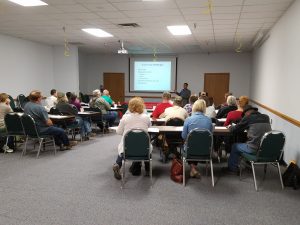
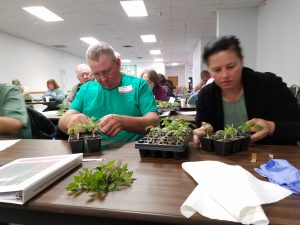
Workshops provided in-depth information on high tunnel vegetable crop management. Participants spent a significant amount of time understanding the value of soil management. Speakers discussed several approaches that could be implemented to improve soil organic matter and soil quality within high tunnels. Workshop sessions included compost calculation exercise in which participants calculated amounts of compost and fertilizers that need to be added under a given scenario. Participants also spent time understanding how to use the NRCS tool: Web Soil Survey. Many participants found it fascinating and at the same time overwhelming, however, the exercise was one of the highlights of the workshop.
Participants also appreciated the information provided on identifying and managing key insect pests and diseases inside high tunnels. A hands-on grafting exercise was organized to provide information on grafting methods, rootstocks and scions, and benefits and challenges of grafting. The session on environmental controls was well received as participants had a lengthy discussion on how early to plant in high tunnels and what precautions to take if doing so.
Visits to commercial high tunnels was highly appreciated by participants as they got an opportunity to observe practices and techniques and discuss things with fellow participants and growers. Site visits encouraged peer-to-peer learning and led to several discussions on topics that were not covered in the workshops for example marketing of produce, labor management, and tools and equipment.
Highlights of the evaluation results include:
- Farmers implemented what they learned at the trainings, with 77 percent making at least one change in practice. Changes to insect pest management and crop diversity were the most common.
- Respondents now have resources to continue learning about high tunnels, with 98 percent agreeing or strongly agreeing they know where to go or whom to ask for information regarding high tunnels.
- Similarly, over half (55 percent) of respondents have used the high tunnel manual they received at the training. Service providers and educators commonly used it to answer client questions, and growers have used it to make production decisions.
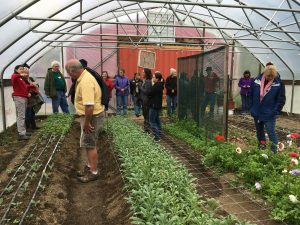
Core objectives:
• Provide a platform to share resources, knowledge, and expertise in the area of high tunnel vegetable production
• Connect agricultural educators to professionals in the area of sustainable vegetable production
• Educate local agencies, organizations, extension staff, and growers about efficient crop production, crop rotation, integrated pest management, fertility and soil management approaches inside high tunnels.
The first Iowa High Tunnel Short Course was organized on 6 November, 2017 at the Garden Room, Reiman Gardens, Ames, IA. The course was designed to highlight production and management of several high tunnel crops, along with providing information on the economics and marketing aspects of high tunnel crop production. An update on the status of high tunnel research across the Midwest will also be provided.
The keynote speaker was Adam Montri, who along with his wife Dru owns Ten Hens Farms in Bath, Michigan. The farm was founded in 2008 and now contains three acres of outdoor production during the traditional Midwest growing season and 17,000 square feet of high tunnel space. Montri is also a hoophouse outreach specialist in the Department of Horticulture at Michigan State University. Other speakers at the Short Course included Drs. Cary Rivard (KSU), Ajay Nair (ISU), Laura Iles (ISU), Lina Rodriguez-Salamanca (ISU) and Joe Hannan (ISU).
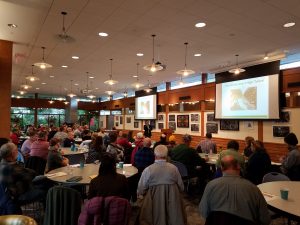
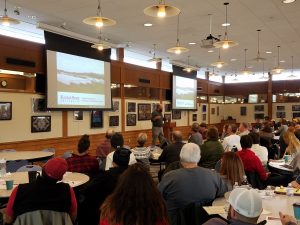
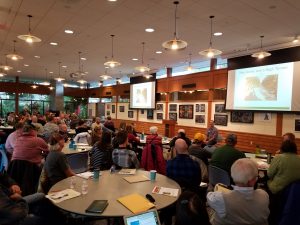
The High Tunnel Short Course was attended by 80 participants comprising of extension personnel, growers, county staff, non-profits, NRCS, and staff from Iowa Department of Agriculture & Land Stewardship. Participants learned about cucumber production, crop diversity, marketing, and disease and insect management in high tunnel crop production. Participants also engaged in several group discussion and activities.
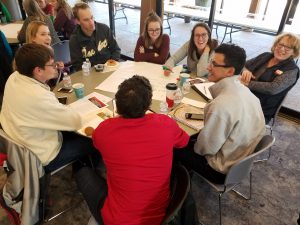
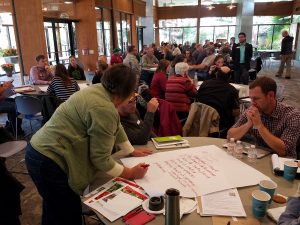
• Highlight the importance of crop, environment, and soil management for vegetable production in high tunnels
• Provide a platform to share resources, knowledge, and expertise in the area of high tunnel vegetable production
• Promote peer-to-peer learning
An on-farm field day was organized at Rinehart Farms, Boone, IA on 8/30/2017. Participants got an opportunity to see the high tunnel in operation and also visit other sites at the farm.
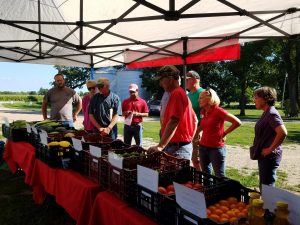
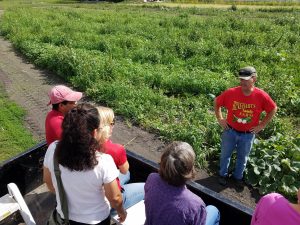
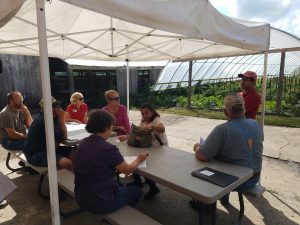
• Highlight the importance of crop, environment, and soil management for vegetable production in high tunnels
• Provide a platform to share resources, knowledge, and expertise in the area of high tunnel vegetable production
• Promote peer-to-peer learning
Iowa State University’s annual Fruit and Vegetable Field Day on Aug. 7 featured research and demonstration projects on high tunnel fruit and vegetable production for commercial growers, extension personnel, non-profit organizations and master gardeners. In addition to high tunnels, the event provided opportunity to interact with researchers and evaluate research projects focusing on tomato grafting, integration of poultry and vegetable production, organic vegetable production, asparagus production, pest management in gourd crops, viticulture, hops, and honey bee health and behavior studies. Equipment and tools used in small-scale fruit and vegetable production systems were also on display. The field day will also demonstrated the use of a potato digger and a vegetable wash station.
The field day was organized in partnership with Practical Farmers of Iowa, Iowa Fruit and Vegetable Growers Association and the Leopold Center for Sustainable Agriculture. Partial funding was provided by this high tunnel project.
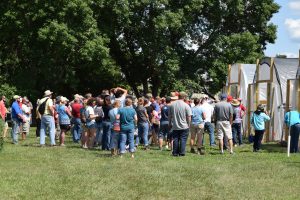
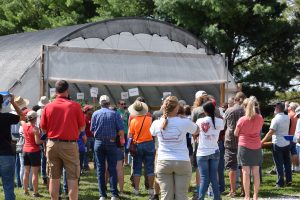
• Expose extension personnel, growers, agency partners, and stakeholders to high tunnel research across Midwest
• Provide a platform to share resources, knowledge, and expertise in the area of high tunnel vegetable production
• Promote peer-to-peer learning
• Leadership development opportunity for younger extension personnel
An educational /professional development trip for extension staff, agricultural educators, and leaders from grower organizations was organized to attend Great Lakes Fruit, Vegetable and Farm Market Expo (GLEXPO; 4-7 December, 2017). The GLEXPO had educational tracks that covered several topics such as advanced soil management in high tunnels, nutrient management in fruit and vegetable production, and marketing of fruit and vegetables. The GLEXPO visit included representatives from Practical Farmers of Iowa leaders, Iowa Fruit and Vegetable Growers Association, ISU Extension and Outreach, and ISU Research and Demonstration Farms.
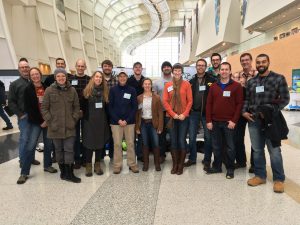
Extension personnel and agricultural professionals thoroughly enjoyed the exposure to a nationally acclaimed conference. Participants attended several educational session focused on vegetable crop production. They also got a chance to explore the trade show which showcases tools and equipment used in specialty crop production. Few growers purchased small tools for their farms. Researchers and extension staff interacted with their counterparts and colleagues in Michgan, Illinois, Indiana, Wisconsin, and Minnesota.
Educational & Outreach Activities
Participation Summary:
Learning Outcomes
Project Outcomes
Workshops provided in-depth information on high tunnel vegetable crop management. Participants spent a significant amount of time understanding the value of soil management. Speakers discussed several approaches that could be implemented to improve soil organic matter and soil quality within high tunnels. Workshop sessions included compost calculation exercise in which participants calculated amounts of compost and fertilizers that need to be added under a given scenario. Participants also spent time understanding how to use the NRCS tool: Web Soil Survey. Many participants found it fascinating and at the same time overwhelming, however, the exercise was one of the highlights of the workshop.
Participants also appreciated the information provided on identifying and managing key insect pests and diseases inside high tunnels. A hands-on grafting exercise was organized to provide information on grafting methods, rootstocks and scions, and benefits and challenges of grafting. The session on environmental controls was well received as participants had a lengthy discussion on how early to plant in high tunnels and what precautions to take if doing so.
Visits to commercial high tunnels was highly appreciated by participants as they got an opportunity to observe practices and techniques and discuss things with fellow participants and growers. Site visits encouraged peer-to-peer learning and led to several discussions on topics that were not covered in the workshops for example marketing of produce, labor management, and tools and equipment.
Pre- and post-test
All workshops included a pre- and post-evaluation. The pre-workshop evaluation established baseline knowledge, attitude, skills, and current programming efforts in high tunnel vegetable production. The post-workshop evaluation measured changes in attitude, knowledge, and skills as a result of participation in the event. Below are evaluation results:
Reporting combined data from all three workshops (Fort Dodge, Ottumwa, and Dubuque)
Rating scale used: 0=None; 1=Low; 2=Moderate; 3=High
| Topic | Score before workshop | Score after workshop |
| Soil management in high tunnels using compost and cover crops | 1.3 | 2.7 |
| Grafting as a tool to manage disease in high tunnels | 1.0 | 2.5 |
| Pests and integrated pest management strategies for high tunnel crop production | 1.2 | 2.5 |
| Environmental Control | 1.5 | 2.6 |
Program impact
Rating scale: 1=Strongly Disagree; 2=Disagree; 3=Neutral; 4=Agree; 5=Strongly Agree
1. I have processed information into new knowledge– 4.6
2 I will use new information to answer client questions – 4.2
3. I was able to network with growers/colleagues – 4.8
4. I will incorporate information on high tunnels in my extension events – 4.1
5. I feel more informed about high tunnels and their applications – 4.5
Here is the link to:
1. 8 month follow-up survey Survey-and-interview-report-SARE-PDP-Nair-Enderton-2016-2018
2. 1 page infographic 2-page-infographic-HT-evaluation-2018-FINAL 1-page-infographic-HT-evaluation-2018-FINAL